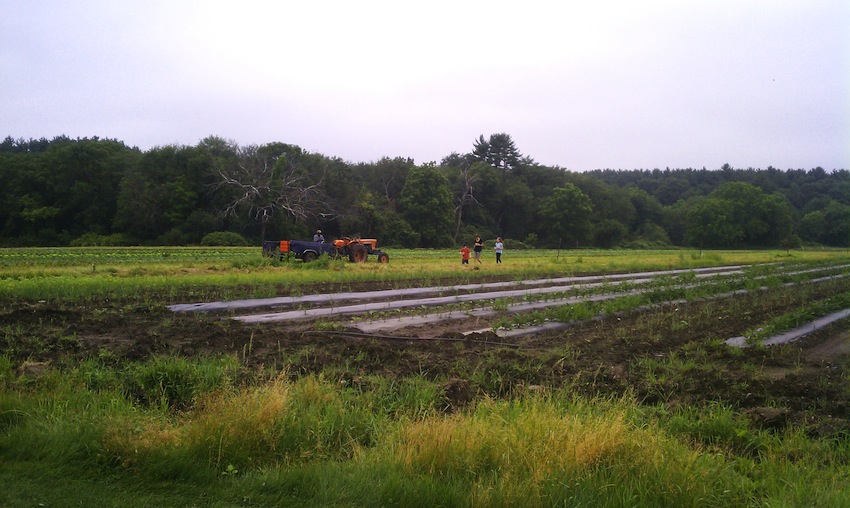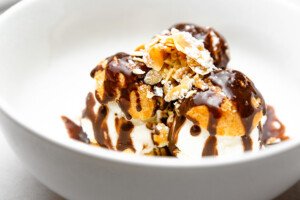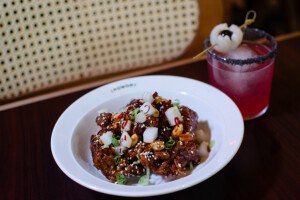Supply Chain: A Day at Verrill Farm in Concord
Welcome to Supply Chain, where we go behind the plate to get a feel for the day-to-day of Boston’s most relied-upon restaurant purveyors.
There’s a thick film of fog covering the ground when I set out for Concord first thing in the morning. The air is already sticky and warm. By the time I’ve broken out of the sluggish commuter traffic, my lead foot and I flying solo down 2A-W, the haze has lifted a little and left slate gray clouds in its wake. The trees lining the road are exploding with lush green leaves, the concentrated tangle of summertime woods darkening behind them.
I whiz past the quintessential west-of-Boston attractions—Minuteman National Park, Paul Revere’s capture site, Walden Pond—and in a matter of minutes, I’ve arrived at Verrill Farm’s sprawling farm stand, the gravel crunching under my tires. The girl manning the pick-your-own strawberry booth is reading with her chin propped up in her hands, and a woman and her kids pick berries quietly in the distance.
Soon, I’m face-to-face with the man himself, Stephen Verrill. A wide-brimmed straw hat with a sunflower band is perched on his head, and his eyes crinkle behind his glasses when he laughs. Although he’s pushing 80, he’s manhandling a U-boat piled high with CSA boxes. He has been doing this, quite literally, his entire life: he was already driving tractors by the time he was eight years old, he tells me.
Verrill Farm has been kicking it since 1918, originally operating as a successful dairy business. In 1957, a young Stephen, fresh off a stint at Cornell, took over the reigns from his father, Floyd. He kept things status quo, surrounded by 150-some-odd cows, and soldiered on well past the death of the daily milk bottle delivery system and the advent of big-box supermarkets, until he just couldn’t sustain business any longer. By 1990, a decision had been made to sell off the herd and set up shop in the realm of vegetables. By 1995, they were operating their first farm stand and had begun supplying restaurants in and out of the city with produce.
Verrill says he doesn’t miss the milk business, where it was easy to lose money and required more work (“We were milking all those cows three times a day, so this feels like retirement!” he jokes). These days, Verrill and his wife Joan, along with their daughter Jennifer, look after 200 acres of land (100 for farming, and 100 for wildlife habitats, woodlands, and wetlands), a fully stocked store, a fully operating industrial kitchen, deli, and bakery, and a staff of 85.
“When we first started dealing with restaurants, we had a young fellow working here who would take his cell phone to bed with him,” Verrill says. “Chefs would call him at 1 or 2 in the morning when they were closing down for the night.”
Hamersley’s Bistro was among the first to climb aboard, along with The Charles Hotel’s Henrietta’s Table. Chef Steve Johnson of Rendezvous has been a fan since his days working at Hamersley’s. “Steve Verrill is a smart, talented grower and a good steward of the land,” says Johnson, who has been buying from Verrill for 23 years and counting. “I’ve had the pleasure of walking the fields there with him on many occasions over the years. He’s the living embodiment of the phrase, ‘Know your grower!'”
Little by little, the farm’s clientele has beefed up to a list hovering around 40, with appearances by No. 9 Park, 80 Thoreau, and Eastern Standard. The lettuces are constant favorites, and once corn season hits, the phones go nuts. They also deliver staple items like eggs to commercial accounts, like Fidelity and The Boston Globe.
Five years ago, while the Verrill family was away attending a wedding, a ceiling fan in the deli caught fire during a busy Saturday. The entire building burned to the ground, while customers watched in horror and firemen tried in vain to stop it. It was the first disaster to ever befall the family operation, and the rebuilding process was a trying time, to say the least. In a move befitting our current love affair with farmers and local produce, the community rallied around Verrill, spending as much as they could to support them during the transition.
The freshly-built farm stand, topped with a Minuteman weathervane Verrill crafted himself, is now back to normal, the kitchen humming with activity and a few early customers perusing the shelves. We walk back outside and look out over the surrounding fields, where neon green carpets the ground as far as I can see.
Verrill tells me that he has no plans to retire and spend his golden years on a porch somewhere. According to him, he’ll be in the fields until his last day.
“Otherwise, you get rusty,” he says, laughing.





